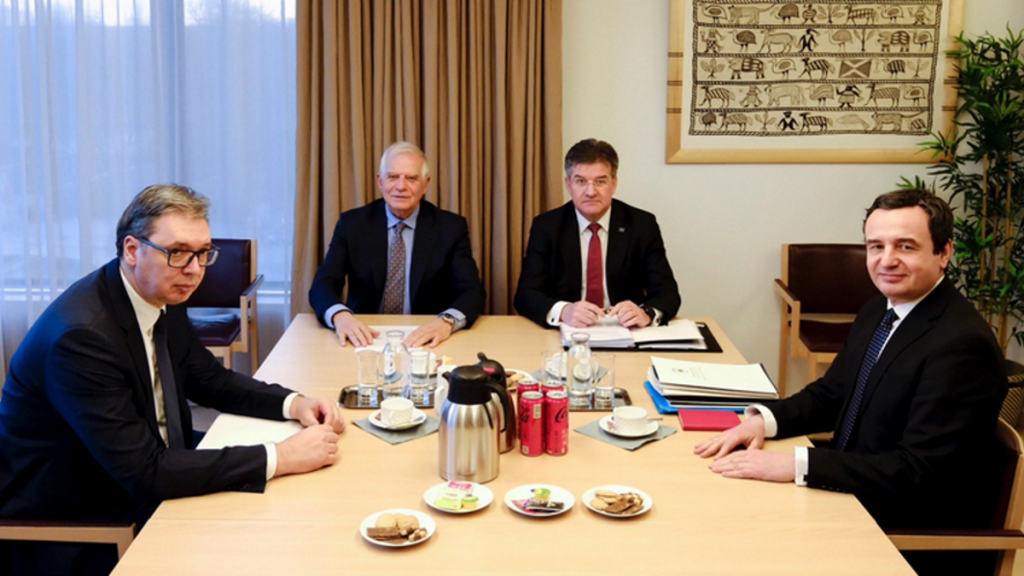The West continues pressuring Serbia to implicitly recognize Kosovo – the Serbian breakaway region that unilaterally declared independence in 2008. At the same time, the European Union and the United States expect Belgrade to resolutely support Ukraine’s ambitions to retake Crimea, the Donbass, as well as parts of the Zaporizhzhia and the Kherson regions that are still under Russia’s control.
On February 27, Serbian President Aleksandar Vučić and the Prime Minister of the self-proclaimed Republic of Kosovo Albin Kurti held another round of talks in Brussels. Over the past few months, they met several times in the de facto capital of the European Union, but to this day no deal on normalization of relations between Belgrade and Pristina has been signed.
This time, however, the EU has openly pressured both sides to accept the EU-brokered proposal on normalization of relations between Serbia and Kosovo. Brussels said that Belgrade and Pristina should sign an agreement by March, or “face repercussions from the European Union and United States.” But what will happen if one of the two parties refuse to accept the European plan?
“The international community will respond accordingly and we will support one party more and will shorten support for the other party”, said the EU envoy Miroslav Lajčák.
Even though Vučić and Kurti did not sign a deal on February 27, that does not mean that the EU proposal will be rejected. According to reports, the two leaders will meet again in March, which is when they could sign an agreement that looks very similar to the document based on the Basic Treaty of 1972 between the Federal Republic of Germany and the German Democratic Republic.
Although Brussels nominally pressures both parties to accept the EU proposal, in reality it is Belgrade, rather than Pristina, that is the Western major target. As Vučić stressed in May 2022, the US and the EU expect Serbia to head quickly towards recognizing Kosovo so that they can tell Russian President Vladimir Putin that the Donbass and Kosovo are not about the same issue. Indeed, if Serbia “voluntarily” accepts a secession of its own territory, Putin may no longer be able to use the Kosovo precedent to justify his actions in Ukraine.
That is one of the reasons why the West pushes Serbia to implicitly recognize Kosovo. It is entirely possible that the United States and the European Union will force Vučić to sign the EU proposal on Kosovo on March 24 – the day when NATO launched its aggression against Serbia in 1999. Given that the late Serbian Prime Minister Zoran Ðinđić extradited the former Serbian President Slobodan Milošević to the Hague-based International Criminal Tribunal for the former Yugoslavia in 2001 on Vidovdan – a very important Serbian national and religious holiday – the West could once again try to humiliate the Serbs, by forcing their leader to sign a deal on the day when they commemorate the victims of the NATO bombing campaign against their country.
From the Western perspective, such a move would represent a symbolic, or even a ritual punishment of the Serbs, and would also justify NATO’s aggression against Serbia. In 1999, Serbia fought the war against NATO over Kosovo, but has been defeated. As a result, the Serbian police and army withdrew from Kosovo, and NATO troops entered what Serbia still sees as its southern province. To this day, however, Belgrade refuses to recognize Kosovo’s unilaterally declared independence. Moreover, five EU members – Spain, Greece, Romania, Slovakia and Cyprus – also do not see Kosovo as an independent state.
However, if Vučić signs the EU-brokered deal, the five nations will no longer to continue to support Serbia’s territorial integrity, given that the Article 4 of the EU proposal clearly states that “Serbia will not object to Kosovo’s membership in any international organization”. In other words, Kosovo can freely join NATO, or even the EU, although chances for Brussels to receive any new members are rather slim, at least in the near future.
Given that Russia and China – the United Nations Security Council Members with veto power – do not recognize Kosovo, they can block Pristina’s attempt to join the UN. That is why the West will undoubtedly pressure Serbia to demand from Moscow and Beijing not to veto Kosovo’s UN membership request. Reports suggest that the EU and the US expect Serbia to join the anti-Russian sanctions, a move which could give the Kremlin free hands to “retaliate” by allowing Kosovo to become the newest United Nations member. China, for its part, is expected to abstain from voting, which means that there will be no formal obstacles for the Western-backed entity to join the UN.
Thus, the EU proposal will allow Kosovo to strengthen its statehood, while Serbia will get nothing in return. Finally, after Belgrade implicitly recognizes a secession of its own territory, a formal Serbian recognition of Kosovo will be just a matter of time.
